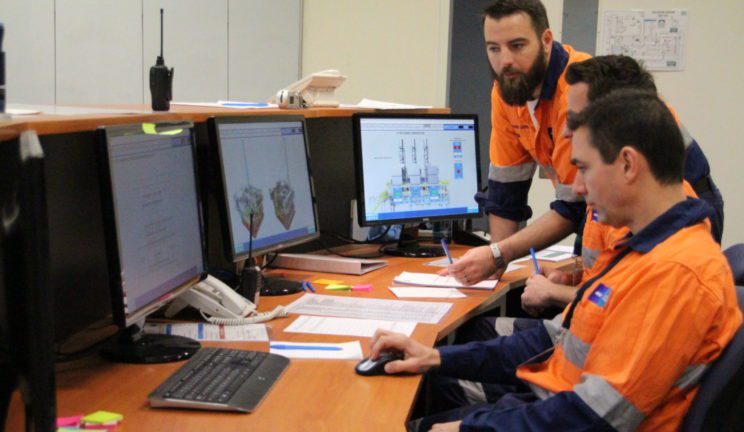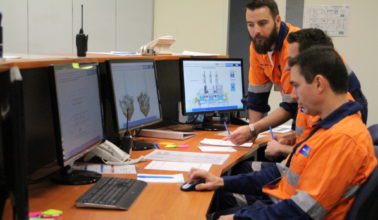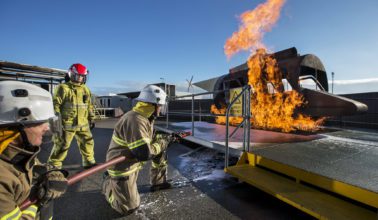Incident Commander Training (ICT) Perth
Learn How to Manage & Coordinate an Emergency Response
This training and assessment course covers the skills and knowledge required to manage and coordinate an emergency response. This applies to personnel who are required to assess the magnitude and impact of an emergency, to those who gather, coordinate and implement emergency personnel and equipment and those who initiate the necessary communication responses, both within and outside the facility.
In order for team leader/s to complete the qualification, they must be accompanied by team members from the same organization.
This training applies to persons who would normally be in control or command of a facility or be required to deputise in this role. Typical facilities could include:
- Onshore/offshore installation/rig
- Floating facility (e.g. floating storage and offloading (FSO), floating production, storage and offloading (FPSO), and floating liquefied natural gas (FLNG))
- Onshore hydrocarbons production, processing and/or storage facilities
- Pipeline and related facilities
- Chemical manufacturing plant
Course Availability
ERGT Australia’s Incident Commander Training course is available through corporate group bookings at our Perth Incident Management Training Centre. Please enquire for more information.
- Minimum Trainees: 1 Incident Commander and 5 Team members (2 days)
- Maximum Trainees: 2 Incident Commanders and 10 Team members (3 days)
Learning Outcomes
The expected learning outcomes for these nationally recognised units are:
PMAOWHS511 Manage emergency incidents (Team leaders)
- Collect and assess emergency information
- Implement emergency response strategies
- Liaise with emergency control
- Coordinate emergency responses
- Assess emergency response/actions
- Undertake post-emergency evaluation
PMAOMIR322 Manage incident response information (Team members)
- Collect and analyse data during an incident
- Record and report information during an incident
- Review incident response information and recommend process improvements
ERGT Desired Skills and Knowledge
This course is designed for very experienced managers who are a member of their organisation’s Emergency Response (ER) Team and who participate in ER drills and exercises. It is recommended that they have completed Fire Fighting and Operate Breathing Apparatus certifications and regularly practice the skills and knowledge delivered in these courses.
These individuals should be familiar with organisational procedures and plans listed below:
- Safety Cases, Hazard and Hazard Control, Incident, Fire and Accident
- Environmental Protection, Facility Emergency Management and Safety Systems
- Emergency Communication Systems, ER Plans
For commanders, please note:
Due to the level of relevant skills and knowledge expected to be held by trainees for each of the units, training will be limited to the following;
- Undertaking critical decision making under pressure
- Dealing with stressed personnel
- Developing effective response plans focused on prevention of escalation and the preservation of human life
- Coordinating responses both on and off the facility
- Liaising with support agencies (internal and external) to maintain the response
Medical and Health Standards
A medical certificate is not required for this course; however, a health questionnaire and declaration of fitness will be required at course registration. Please contact ERGT for any concerns regarding completion of practical training and assessment requirements and to discuss options for reasonable adjustments.
Additional Requirements
A government issued photo identification and valid USI is required for course registration.
Structure and Assessment
This course is delivered through classroom presentations, group discussion and practical demonstrations and exercises. Trainees will demonstrate their competence through written and practical assessment which will occur in both the training room and simulated environment/s.
Ongoing Maintenance of Skills
In alignment with industry expectations and to ensure ongoing competence and capability ERGT recommends skills maintenance be conducted every 2 years.
Authority / Regulator
The Australian Skills Quality Authority in the National regulator for Nationally Recognised Training delivered by Australia’s vocational education and training sector.
†No GST applicable
*Price Includes GST
+Price includes GST / ^No GST applicable



